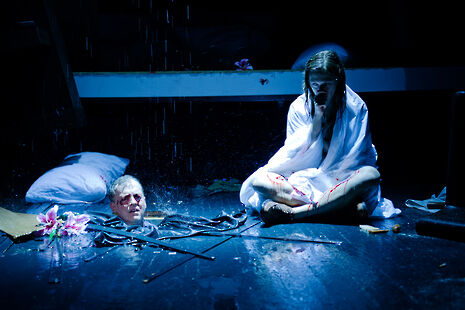It’s IN-YER-FACE!
Laura Robinson gets up close and personal with the provocative writing ‘movement’ of 1990s Britain.

The 1990s, a decade that gave birth to Trainspotting, grunge rock and Tarantino. The unapologetic display of ‘anti-culture’, of Kurt Cobain’s dark mutation of the pop song, of heroin needles and bloody white shirts challenged our sensitivities in between Spice Girls CDs and screenings of Clueless. In the world of theatre, it was the time of Tom Stoppard’s Arcadia, Larson’s Rent, and Philip Ridley’s The Fastest Clock in the Universe, which is making its debut on the Cambridge theatre scene at the Corpus Playroom on the 10th November. While Arcadia and Rent depict the clash of chaos against order, Ridley’s work contributed to a group of playwrights in Britain who took this conflict to a higher level. The unflinching portrayal of the taboo, the want of the unseen and unspoken, a space for ‘Thatcher’s children’ to project the violence, drugs and hardship of the 1990s, was the cause d’être of ‘in-yer-face’ theatre.
“[They] had the impertinence, no, the hubris to utter those most terrifying of words: ‘I love you.’ [But] what did they mean by them? They meant: ‘I’ve fucked you and now I need to fuck you again, and possibly a few more times after that and I’ll be jealous, insane with jealousy if anyone else fucks you’. All they do is fuck each other and all they talk about is how they do it, and who they’d really rather be doing it with or to – and they don’t cloak it in their language.” Michael Curtis, the middle-aged writer in Simon Gray’s Japes, attempts to make sense of this new writing phenomenon, confused as to how it can be both vulgar and grammatical, how language that is unspeakable can collide with language that is enunciated “so that the verbs and nouns stick out – in your face.” Indeed, characterised by what society deemed as ‘vulgar’, and desiring to break away from the ideological, state-of-the-nation plays that charmed the upper echelons, ‘in-yer-face’ was defined by the shocked emotional response that the plays would garner from its audience, as well as by its graphic impropriety: physical abuse, nudity, sex, humiliation.
One of the forerunners of this movement was Sarah Kane, a playwright who rejected her evangelical upbringing, and suffered throughout her life from depression; after being admitted for taking an overdose of her prescription drugs, she hanged herself in the hospital’s bathroom in 1999, at the age of 28. Her plays are defined by their unflinching rawness and brutality, and the controversy they attracted. Kane’s first play, Blasted, was headlined in the Daily Mail as “this disgusting feast of filth”; in the midst of a war, a misogynistic, racist tabloid journalist invites a young, fragile woman to his hotel room in Leeds whom he attempts to seduce. What follows are scenes of oral sex, masturbation, rape, cannibalism, suicide and masturbation, including a scene in which one character sucks out another’s eyes. Arousing aggressive rebuttals among theatre critics, Kane’s work was deemed immature and gratuitous, rather than expressive and real. The image of a Bosnian woman hanging from a tree during the Bosnian war – the sad, unrestricted reality of civil strife that partly inspired Kane during the writing process of Blasted – was lost upon the sensibilities of the critics.
Kane’s contemporary and obituary writer, Mark Ravenhill [who dubbed his fellow playwright as “a contemporary writer with a classical sensibility who created a theatre of great moments of beauty and cruelty”] would become another precursor of the movement with his 1996 play, Shopping and Fucking. Set in a world in which consumerism has become the moral code, its cast of desperate twenty-somethings – named after the members of Take That and Scottish songstress Lulu – are disposable, working in fast food joints, selling their image and their bodies. They are born to consume and be consumed, filling themselves on heroin and ecstasy, masochistic sex and prostitution in a consumer culture in which people are commodities.
Philosophy and black humour wrapped in scenes of gaping violence, ‘in-yer-face’ theatre was not born out of a morbid desire to be as flippantly brutal and unnecessarily controversial as a playwright could be. Rather, the shock nature of the plays and their place in experiential theatre force their audiences to react, instead of pondering their philosophy on the walk home and crawling into bed soundly. Week 5’s Corpus main show, Ridley’s The Fastest Clock in the Universe, does just that: the cultural obsession with youth, the societal infatuation with the male, concocted in a heady mixture of sinister, grimy violence. When Blasted was torn apart by the critics, they were unnerved by what in-yer-face theatre encompasses; to borrow from Harold Pinter, “facing something actual and true and ugly and painful’”.
 Interviews / You don’t need to peak at Cambridge, says Robin Harding31 December 2025
Interviews / You don’t need to peak at Cambridge, says Robin Harding31 December 2025 News / Unions protest handling of redundancies at Epidemiology Unit30 December 2025
News / Unions protest handling of redundancies at Epidemiology Unit30 December 2025 Features / ‘Treated like we’re incompetent’: ents officers on college micromanagement30 December 2025
Features / ‘Treated like we’re incompetent’: ents officers on college micromanagement30 December 2025 Comment / What happened to men at Cambridge?31 December 2025
Comment / What happened to men at Cambridge?31 December 2025 Theatre / We should be filming ADC productions31 December 2025
Theatre / We should be filming ADC productions31 December 2025







